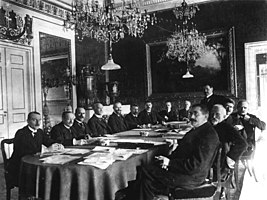Cabinet of Philipp Scheidemann | |
|---|---|
1st Cabinet of Weimar Germany | |
| 13 February 1919 – 20 June 1919 | |
 First meeting of the cabinet | |
| Date formed | 13 February 1919 |
| Date dissolved | 20 June 1919 (4 months and 7 days) |
| People and organisations | |
| President | Friedrich Ebert |
| Minister-President | Philipp Scheidemann |
| Deputy Minister-President | Eugen Schiffer (until 19 April 1919) Bernhard Dernburg |
| Member parties | Social Democratic Party Centre Party German Democratic Party |
| Status in legislature | Weimar Coalition 331/423 (78%)
|
| Opposition parties | German National People's Party Independent Social Democratic Party German People's Party |
| History | |
| Election | 1919 federal election |
| Legislature term | Weimar National Assembly |
| Predecessor | Council of the People's Deputies |
| Successor | Bauer cabinet |
The Scheidemann cabinet, headed by Minister President Philipp Scheidemann of the Social Democratic Party (SPD), was Germany's first democratically elected national government. It took office on 13 February 1919, three months after the collapse of the German Empire following Germany's defeat in World War I. Although the Weimar Constitution was not in force yet, it is generally counted as the first government of the Weimar Republic.
It was formed from members elected in January 1919 to the Weimar National Assembly, which was to act as Germany's interim parliament and adopt a constitution for the new republic. The cabinet was based on the Weimar Coalition of three centre-left parties: the SPD, the Centre Party and the German Democratic Party.
During its time in office, Scheidemann's cabinet had to deal with leftist uprisings, most notably in Berlin, the Ruhr and Bavaria, and with separatist movements in the occupied Rhineland and in eastern provinces of Prussia such as Posen and Silesia. By far its biggest challenge, however, was responding to the Armistice of 1918 and the Paris Peace Conference. The tension between the outrage at the terms of the Treaty of Versailles and the potential repercussions of rejecting the treaty led to the breakup of the cabinet. Scheidemann, who had called the treaty "intolerable", resigned in protest against it on 20 June 1919.
Gustav Bauer, also of the SPD, headed the Bauer cabinet that replaced Scheidemann's.